
 Flash News
Flash News
Accident at "Shkalla e Tujanit", truck overturns in the middle of the road, driver injured
Vlora by-pass, work delays and cost increases
Milan are expected to give up on the transfer of Granit Xhaka
Inceneratori jashtë funksionit, përfshihet nga flakët fusha e mbetjeve në Elbasan
Accident on the Lezhë-Shëngjin axis, one injured
Document/ The General Prosecutor's Office starts an in-depth investigation into judge Irena Gjoka

The truth about the past of the 54-year-old judge Irena Gjoka, who used to bear the surname Shpata (Irena Shpata) and since 2011 uses the surname of her current (second) husband, Gjoka, has become a bone of contention between the opposition and the judiciary.
According to the documents published in the Greek media, Irena Gjoka was arrested in Greece for using false documents with which she tried to show that she was of Greek origin. At first this was reported by the newspaper "Ta nea", then the documents were published by the newspaper "Prothotema".
The Greeks were motivated by the decisions that left Fredi Beleri in prison, but the opposition increased the pressure when the same judge placed Sali Berisha under house arrest, in connection with the investigations into the privatization of the Partizani complex.
Lapsi.al inquired with the General Prosecutor's Office and in the answer given by the Director of Institutional Coordination, Kostaq Beluri, it is accepted that for Judge Irena Gjoka "an in-depth investigation" was launched on May 8, which also includes sending the request for relevant documents to EU countries, USA, Canada and Australia.
To the question: "Have letters been sent regarding a sentence for the deportation of Irena Gjoka from the countries of the Schengen area?", the prosecution answered: "In the interests of in-depth verification, the General Prosecutor's Office has addressed a request for information and documents to all institutions defined by the law".
Law 138/2015 stipulates that requests are sent to the countries of the European Union, the United States, Canada and Australia. The General Prosecutor's Office admits that the request has been addressed to the relevant judicial authorities, but that "an answer to the request has not yet been received".

According to the Greek media, Irena Gjoka and her first husband tried to enter Greece on December 24, 2002, through the Kakavija border point, using a forged consular visa, in terms of the deadline and trying to present themselves as a foreigner. - Epirote.
After the discovery of this forgery, her name was added to the list of persons "non grata" of the Schengen system. She was banned from entering for 10 years for reasons of public safety and her data and fingerprints were filed in the relevant database.
A few months later, on February 13, 2003, Irena Maneku tried to enter Greece again through Kakavija and was denied entry as she was on the "undesirable" list of the Schengen area and was given a corresponding document.
Immediately after that, she appealed to the Administrative Court of First Instance, Athens, against the deportation decision. Her request was sent to the Administrative Court of First Instance in Ioannina, which dismissed Manek's request.
In 2019, Irena Maneku, using the last name of her second husband, applied under the name Irena Gjoka, to become a member of the Special Court Against Organized Crime and Corruption. In order to become a part of this court, a self-declaration form must be filled in, where, among other things, you must confess if there have been deportations, there is a pending judicial process, there is a ban on entering a third country, etc.
In her self-declaration form, judge Irena Gjoka denied that she had been deported. Because of such a cover-up, other officials have been fired and some have been convicted of forgery in the past. However, Irena Gjoka managed to become a judge of GjKKO, to be elected vice-president, but with the functions of the president due to the vacancy.
The lawyers of Sali Berisha requested the exclusion of the judge from the process, who has placed Sali Berisha under house arrest. During the session, said lawyer Genc Gjokutaj, Irena Gjoka accepted the sentence that was for her in Greece, but she said that this was not a reason to exclude her from the case.
In March of this year, the High Judicial Council defended Irena Gjoka for the accusations of the opposition, which claimed that the judge was expelled from the Schengen area. However, after the release of the documents in the media, the KLJ was forced to act by asking the General Prosecutor's Office to verify the charges./Lapsi.al
Latest news








Golem and Qerret without water at the peak of the tourist season
2025-07-01 21:09:32

Euractiv: Italy-Albania migrant deal faces biggest legal challenge yet
2025-07-01 20:53:38
BIRN: Brataj and Fevziu victims of a 'deepfake' on Facebook
2025-07-01 20:44:00

Vlora by-pass, work delays and cost increases
2025-07-01 20:24:29



Milan are expected to give up on the transfer of Granit Xhaka
2025-07-01 19:41:25

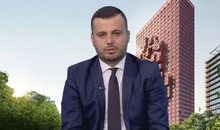
The silent but rapid fading of the towers' euphoria
2025-07-01 18:58:07
Donald Trump's daughter says 'goodbye' to June with photos from Vlora
2025-07-01 18:48:47

Tirana vote recount, Alimehmeti: CEC defended manipulation
2025-07-01 18:15:05

Left Flamurtari, striker signs with another Albanian club
2025-07-01 17:43:14
Accident on the Lezhë-Shëngjin axis, one injured
2025-07-01 17:19:35
June temperature records, Italy limits outdoor work
2025-07-01 17:03:15

Meet Kozeta Miliku, named one of the top five scientists in Canada
2025-07-01 16:32:12
"Arsonist" arrested for repeatedly setting fires in Vlora (NAME)
2025-07-01 16:29:45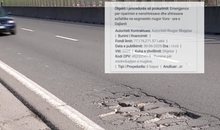

The ecological integrity of the Vjosa River risks remaining on paper
2025-07-01 16:09:40
Heat Headache/ Causes, Symptoms and Measures You Should Take
2025-07-01 16:01:13
UN: The world must learn to live with heat waves
2025-07-01 15:54:50

Three cars collide in Tirana, one of them catches fire
2025-07-01 15:38:16

Shehu: Whoever doesn't want Berisha, doesn't want the opposition 'war'!
2025-07-01 15:19:20
Berisha requests the OSCE Assembly: Help my nation vote freely
2025-07-01 15:11:46
Be careful with medications: Some of them can harm your sex life
2025-07-01 15:00:32
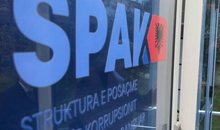
'Golden Bullet'/ Lawyers leave the courtroom, Altin Ndoc's trial postponed again
2025-07-01 14:44:52
EU changes leadership, Kosovo in a number of places
2025-07-01 14:40:01
Should we drink a lot of water? Experts are surprised: You risk hyponatremia
2025-07-01 14:30:20



Lëpusha beyond Rama's postcards: A village that is being silently abandoned
2025-07-01 13:41:56
Scorching temperatures in France close the Eiffel Tower
2025-07-01 13:29:35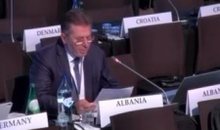
Media: China, Iran and North Korea, a threat to European security
2025-07-01 13:20:12
Albania drops in global index: Less calm, more insecure
2025-07-01 13:09:35
Road collapses, 5 villages in Martanesh risk being isolated
2025-07-01 13:03:04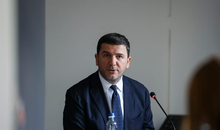

Këlliçi: Opposition action to be decided in September
2025-07-01 12:48:49
Four tips for coping with the heat wave
2025-07-01 12:38:53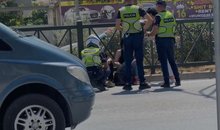
Car hits pedestrian on Transbalkan road
2025-07-01 12:27:09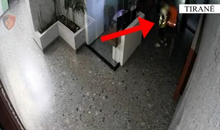
Authors of 9 robberies, Erjon Sopoti and Abdullah Zyberi arrested
2025-07-01 12:15:56
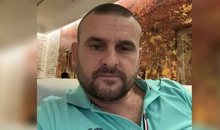
He abused his minor daughter, this is a 36-year-old man in custody in Fier
2025-07-01 11:50:34
The constitution of the Kosovo Assembly fails for the 40th time
2025-07-01 11:40:08


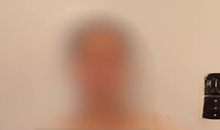
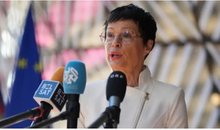
EU confirms support for the Western Balkans
2025-07-01 10:50:45
Serious in Fier! Father sexually abuses his minor daughter
2025-07-01 10:32:33
One year since the passing of the colossus of Albanian literature, Ismail Kadare
2025-07-01 10:25:26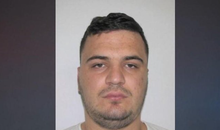


They supplied the 'spaçators' with drugs, two young men are arrested in Tirana
2025-07-01 09:54:09
Europe is "scorching", how dangerous are high temperatures?
2025-07-01 09:48:56


Nigel Farage in Albania: but why?
2025-07-01 09:13:12
Xama: The "Partizani" dossier is quite weak and without facts!
2025-07-01 09:04:47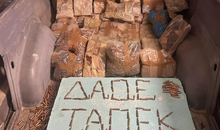

Foreign exchange, the rate at which foreign currencies are sold and bought
2025-07-01 08:35:39
Fabricators again warn of factory closures and job cuts
2025-07-01 08:21:30
Horoscope, what do the stars have in store for you today?
2025-07-01 08:08:59
Scorching hot, temperatures reaching 40°C
2025-07-01 07:57:12
Morning Post/ In 2 lines: What mattered yesterday in Albania
2025-07-01 07:42:59
Recount after May 11, Braho: I had no expectations for massive vote trafficking
2025-06-30 22:54:18

Second hearing on the protected areas law, Zhupa: Unconstitutional and dangerous
2025-06-30 22:18:46



Israel-Iran conflict, Bushati: Albanians should be concerned
2025-06-30 21:32:42

Fuga: Journalism in Albania today in severe crisis
2025-06-30 21:07:11
"There is no room for panic"/ Moore: Serbia does not dare to attack Kosovo!
2025-06-30 20:49:53

Temperatures above 40 degrees, France closes nuclear plants and schools
2025-06-30 20:28:42
Lavrov: NATO is risking self-destruction with new military budget
2025-06-30 20:13:54
Turkey against the "Bektashi state" in Albania: Give up this idea!
2025-06-30 20:03:24

Accused of sexual abuse, producer Diddy awaits court decision
2025-06-30 19:40:44


